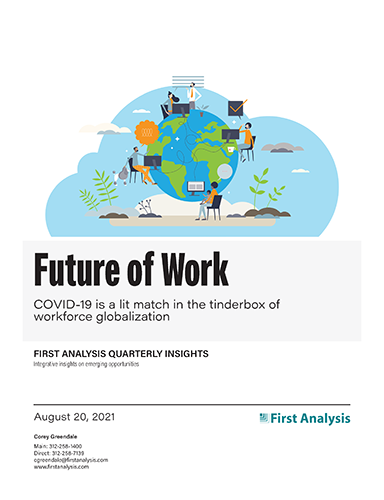Quarterly insights: Future of Work
COVID-19 is a lit match in the tinderbox of workforce globalization

Nearly 18 months into the pandemic, no consensus has arisen on the extent to which workers who had previously worked on site will return to working in the office full time, work remotely full time, or do some of each.
However, one clear trend we expect to emerge is accelerated workforce globalization: Employers will seek to mitigate increasing labor supply shortages and upward wage pressure by tapping the larger global talent pool, finding and engaging with talent well beyond their local presence.
Building a global workforce brings a wide array of challenges, including dealing with myriad cultural practices, labor laws, compliance requirements and tax regulations. Helping employers address these challenges represents a substantial growth opportunity for a new cohort of tech companies that make employing a nationally diverse workforce fast and efficient. We highlight a number of these companies.
TABLE OF CONTENTS
Includes discussion of ten private companies
- 18 months into the pandemic, employers taking diverse workforce approaches
- Fundamentals underpin a shift toward a distributed workforce
- Investments in workforce flexibility favor globalization over traditional office
- Trend toward workforce distribution spurring adoption of globalization technology
- Future of work index resumes lead over S&P 500 and Nasdaq
- Future of work Q3 M&A pace remains strong
- Q3 future of work private placements on pace to 2-year high
18 months into the pandemic, employers taking diverse workforce approaches
In the early days of the U.S. COVID-19 pandemic last year, we published a report with the self-explanatory title “The Future of Work is Flexible,” highlighting our perspective on the likely lasting effects the pandemic would have on the workplace. Nearly 18 months into the pandemic, no consensus has arisen on the extent to which workers who had previously worked on site full time will return to working in the office full time, work remotely full time, or do some of each. Tech bellwethers like Apple, Google and Microsoft have pushed back their return-to-office plans as the Delta variant has taken hold, while others, like Shopify, have decided on remote work as the default (Shopify’s CEO declared the end of the era of “office centricity”), and large investment banks like Goldman Sachs and JP Morgan Chase are generally sticking to plans requiring workers to return to the office sooner rather than later. In our conversations with management teams of private tech companies, we anecdotally hear of some yearning for a return to the office as soon as possible for reasons of collaboration and culture, some expecting to adopt a more flexible approach than in the past, and some looking to get out of their leases and go fully remote as soon as possible to provide workers more flexibility while eliminating commute times and rent expense. In short, no single approach seems to be dominating.

Request full report
To access the full report, please provide your contact information in the form below. Thank you for your interest in First Analysis research.
